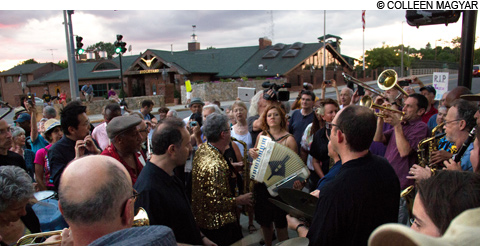This is all true. But the sad and overarching truth is that it doesn't make any difference. WGBH has made their move, and weeknight jazz at WGBH is never coming back, no matter how entitled the jazz community feels about it. The station made that clear when they hired Phil Redo, the current managing director of the station, three years ago. Redo's background — aside from an early aughts stint at New York's non-commercial WNYC — is largely in corporate commercial radio, most recently at Boston's Greater Media. Redo has said that jazz is "part of WGBH's DNA," and that it's never going away. The move to weekends only was a way to put a "new focus on jazz," as the WGBH press release announced. Or, as he told me, it was more honest to move jazz to weekends rather than chip a way at it an hour at a time to replace it with news and public affairs as the station had been doing, essentially since cutting an hour from Jackson's slot a couple of years ago.
 |
Or, as longtime radio watcher Scott Fybush, editor for the past 19 years of Northeast Radio Watch, told me, " 'GBH would never have hired someone like Phil if they didn't want to run the station like a business." And business, in Boston radio, means news and talk. Or, in the lingo of NPR, "news and information." As Fybush told me, "News/talk has been the Holy Grail of public radio because the perception is that it's the one format that brings in sizeable audiences and sizeable young audiences." Jazz, he said, has suffered under the perception that even though jazz listeners "are fiercely loyal . . . they don't give as much classical or news/talk listeners." Of course, tell that to fans of 'GBH's long-gone morning classical programming. But point taken: in a business where, traditionally, 50 cents of every dollar comes from listeners, that listenership speaks for a lot.
So 'GBH is going hard for the news-talk audience, and hard after its chief competitor, WBUR, which has been phenomenally successful with news. Although the numbers are hard to come by (Arbitron doesn't officially keep ratings for non-commercial radio), 'BUR has been not only one of the top NPR stations in the country, but based on unofficial ratings, the number-one radio station in Boston at drive time.
WGBH has been slow to go after those numbers, but by developing news and talk shows like The Takeaway, Boston Public Radio, and The World, and strategically doubling up some of 'BUR's national feeds like Morning Edition and Marketplace, they're showing that they're serious.
All of which does not help the Boston jazz community. And there is no obvious recourse. There is nothing in WGBH's FCC license that compels them to serve the jazz community — just "the community." That's a highly subjective category, even in a "community" with two of the most esteemed jazz higher-education programs in the country. That's why my advice to jazz folks is: fugettabout it. If you want more jazz on the radio, you'll have to look elsewhere.